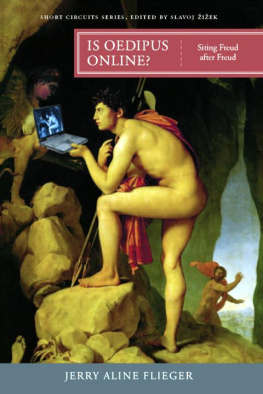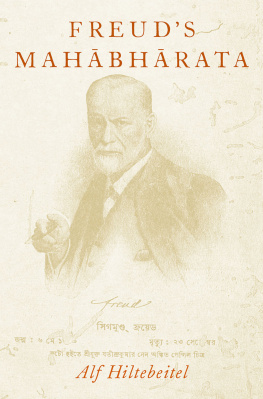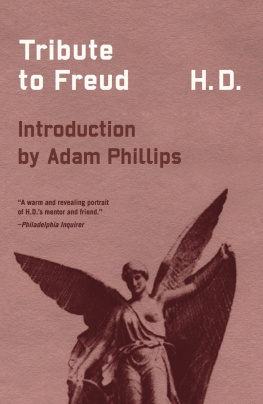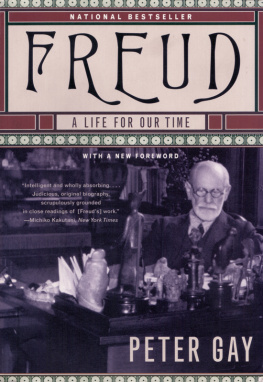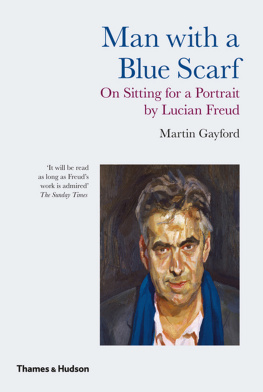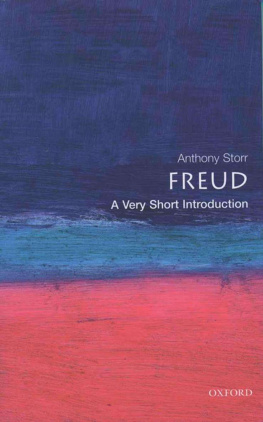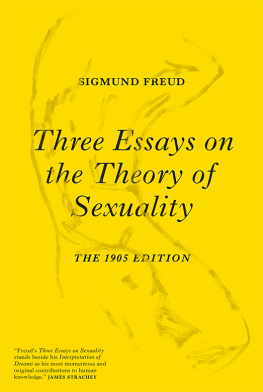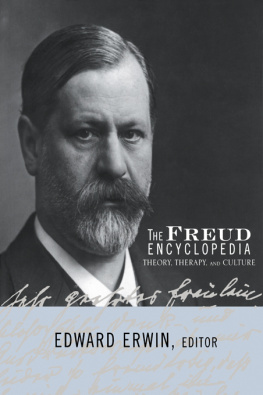Jerry Aline Flieger - Is Oedipus Online? Siting Freud after Freud
Here you can read online Jerry Aline Flieger - Is Oedipus Online? Siting Freud after Freud full text of the book (entire story) in english for free. Download pdf and epub, get meaning, cover and reviews about this ebook. year: 2005, publisher: The MIT Press, genre: Romance novel. Description of the work, (preface) as well as reviews are available. Best literature library LitArk.com created for fans of good reading and offers a wide selection of genres:
Romance novel
Science fiction
Adventure
Detective
Science
History
Home and family
Prose
Art
Politics
Computer
Non-fiction
Religion
Business
Children
Humor
Choose a favorite category and find really read worthwhile books. Enjoy immersion in the world of imagination, feel the emotions of the characters or learn something new for yourself, make an fascinating discovery.
- Book:Is Oedipus Online? Siting Freud after Freud
- Author:
- Publisher:The MIT Press
- Genre:
- Year:2005
- Rating:4 / 5
- Favourites:Add to favourites
- Your mark:
- 80
- 1
- 2
- 3
- 4
- 5
Is Oedipus Online? Siting Freud after Freud: summary, description and annotation
We offer to read an annotation, description, summary or preface (depends on what the author of the book "Is Oedipus Online? Siting Freud after Freud" wrote himself). If you haven't found the necessary information about the book — write in the comments, we will try to find it.
Is Oedipus Online? Siting Freud after Freud — read online for free the complete book (whole text) full work
Below is the text of the book, divided by pages. System saving the place of the last page read, allows you to conveniently read the book "Is Oedipus Online? Siting Freud after Freud" online for free, without having to search again every time where you left off. Put a bookmark, and you can go to the page where you finished reading at any time.
Font size:
Interval:
Bookmark:

Slavoj Zizek, editor
The Puppet and the Dwarf: The Perverse Core of Christianity, by Slavoj Zizek
The Shortest Shadow: Nietzsche's Philosophy of the Two, by Alenka Zupan?ic
Is Oedipus Online? Siting Freud after Freud, by Jerry Aline Flieger
Jerry Aline Flieger
For my mother, Betty Jane Flieger
ix
xi
I Resiting Oedipus
II Freud Sightings in Millennial Theory
A short circuit occurs when there is a faulty connection in the network-faulty, of course, from the standpoint of the network's smooth functioning. Is not the shock of short-circuiting, therefore, one of the best metaphors for a critical reading? Is not one of the most effective critical procedures to cross wires that do not usually touch: to take a major classic (text, author, notion), and read it in a shortcircuiting way, through the lens of a "minor" author, text, or conceptual apparatus ("minor" should be understood here in Deleuze's sense: not "of lesser quality," but marginalized, disavowed by the hegemonic ideology, or dealing with a "lower," less dignified topic) ? If the minor reference is well chosen, such a procedure can lead to insights which completely shatter and undermine our common perceptions. This is what Marx, among others, did with philosophy and religion (short-circuiting philosophical speculation through the lens of political economy, that is to say, economic speculation); this is what Freud and Nietzsche did with morality (short-circuiting the highest ethical notions through the lens of the unconscious libidinal economy). What such a reading achieves is not a simple "desublimation," a reduction of the higher intellectual content to its lower economic or libidinal cause; the aim of such an approach is, rather, the inherent decentering of the interpreted text, which brings to light its "unthought," its disavowed presuppositions and consequences.
And this is what "Short Circuits" wants to do, again and again. The underlying premise of the series is that Lacanian psychoanalysis is a privileged instrument of such an approach, whose purpose is to illuminate a standard text or ideological formation, making it readable in a totally new way-the long history of Lacanian interventions in philosophy, religion, the arts (from the visual arts to the cinema, music, and literature), ideology, and politics justifies this premise. This, then, is not a new series of books on psychoanalysis, but a series of "connections in the Freudian field"-of short Lacanian interventions in art, philosophy, theology, and ideology.
"Short Circuits" intends to revive a practice of reading which confronts a classic text, author, or notion with its own hidden presuppositions, and thus reveals its disavowed truth. The basic criterion for the texts that will be published is that they effectuate such a theoretical short circuit. After reading a book in this series, the reader should not simply have learned something new: the point is, rather, to make him or her aware of another-disturbing-side of something he or she knew all the time.
Slavoj Zizek
An interdisciplinary project of this scope has required extensive research and travel, and I am grateful to several institutions for making this possible. I would like to thank Rutgers University for consistently encouraging interdisciplinary projects outside conventional fields of research. The Department of French and the Program in Comparative Literature have been particularly supportive, by providing funds for travel and opportunities to teach theory courses not limited to literary theory. The group of graduate students who have worked with me on topics related to this book-through five long years of seminars on Freud and culture-deserve special thanks. Their enthusiasm for this project has buoyed me throughout the long process of research and writing.
Many colleagues have been equally helpful. In particular, I wish to thank Fredric Jameson, Slavoj Zizek, John Higgins, Ian Buchanan, my friend and editor the late Elizabeth Wright, and Edmond Wright for encouraging this research and the publication of my work. This project has provided extensive contact with scholars worldwide, and I am grateful to the institutions and colleagues who have invited me to visit and to teach. Specifically, I wish to thank David Bennett and the Department of English at the University of Melbourne for sponsoring my research grant as visiting scholar in 2000; as well as Ian Buchanan for his invitations to speak in Tasmania and at the Deleuze conference in Western Australia. In the same year, Hisashi Muroi and Hiroshi Yoshioka arranged for me to meet scholars and researchers in Japan at Yokohama University, Konan University in Kyoto, Tokyo University, and the Japanese Institute for Media Arts and Science (IMAS). These visits provided fascinating opportunities to study media art and culture in Asia, and to exchange ideas with people in Japan who are engaged in related work. I also wish to thank Ranjit Nair and Shiva K. Srinivasan for arranging my visit to India in 2000, where I met many interesting scientists and theorists at the India Institute of Technology and at the Institute for the Foundation of Science and Culture in Delhi. In the People's Republic of China, Wang Ning and his colleagues at the Universities of Beijing and Nanjing provided invaluable opportunities to exchange ideas at conferences on East-West cultural relations and cultural theory. I also wish to thank Antal Bokay and the Soros foundation for sponsoring my graduate seminar on "millennialism" at Janos Pannonius University in Hungary. Finally, I wish to thank the Slovenian art review Maska, and the Department of Philosophy at Ljubljana University, for sponsoring my 2003 visit to Slovenia.
The actual writing of this book began with a paper at the international 1996 Cyberconf in Spain, sponsored by the Telefonica corporation, so I am especially grateful to the organizers Susie Ramsey, Rosanne Stone, and Rafael LorenzoHammer. Meeting the theorists and performance artists who participated in that weeklong event in Madrid was an unforgettable experience that has shaped my work ever since. My friends and colleagues in South Africa also deserve particular thanks-especially John Higgins, John Noyes, and Reingard Nethersole and the "hard-thinking gang" at Cape Town-for inviting me to visit and teach at the University of Cape Town, University of the Western Cape, University of the Witwatersrand, and Rhodes University. Finally, I am grateful for the many opportunities that Norman Holland's group IPSA has provided for contacts with people working on psychoanalysis and culture in Russia and Western Europe, including Robert Silhol's group in France. These intellectual opportunities abroad have contributed enormously to this work and have shaped my assessment of global culture in this "bimillennial" era.
I am equally indebted to friends and colleagues in this country for their help in the research and writing of this book, and to Roger Conover, Slavoj Zizek, and my editors at MIT for their patience and generosity in bringing the project to fruition. For their contribution to my knowledge of the clinical practice of psychoanalysis and its relation to culture, I wish to thank the organizers and participants of the ongoing seminar at the Cornell University Medical School's Department of the History of Psychiatry. I also need to express special thanks to Manuel De Landa, who was a peerless resource when I was thinking about the scientific aspects of this project. Special thanks also go to my friends Christopher Lane, Martha Noel Evans, and John Bloom for their useful intellectual and editorial feedback during the writing process.
Font size:
Interval:
Bookmark:
Similar books «Is Oedipus Online? Siting Freud after Freud»
Look at similar books to Is Oedipus Online? Siting Freud after Freud. We have selected literature similar in name and meaning in the hope of providing readers with more options to find new, interesting, not yet read works.
Discussion, reviews of the book Is Oedipus Online? Siting Freud after Freud and just readers' own opinions. Leave your comments, write what you think about the work, its meaning or the main characters. Specify what exactly you liked and what you didn't like, and why you think so.

